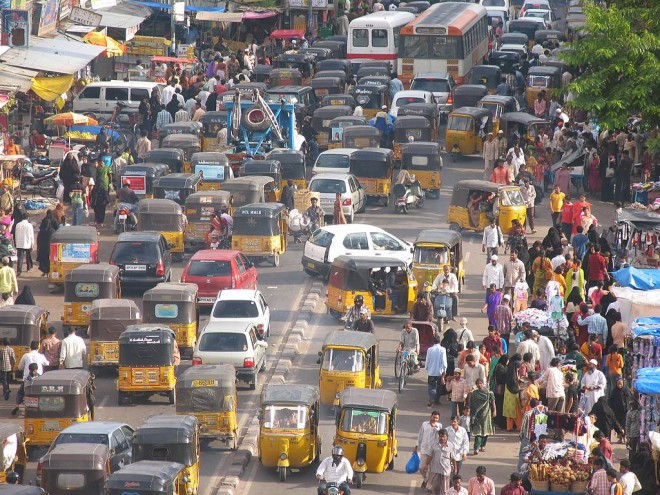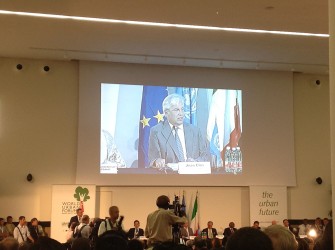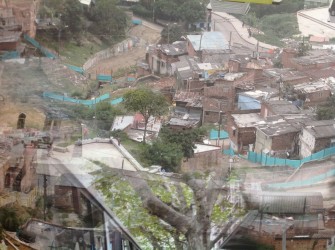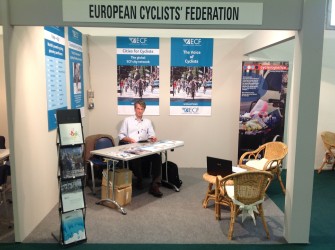
Cycling Is A City Changer: Insight Into The World Urban Forum
One billion people live on less than one dollar a day, yet their demand for mobility is growing. ECF’s Secretary General, Bernhard Ensink reflects on a recent trip to Naples, where he took part in UN Habitat’s World Urban Forum.
My eyes were opened on a recent trip to Naples in Italy. I was taking part in the sixth session of the World Urban Forum (WUF), and I was once again reminded just how quickly our planet is ‘urbanising’. Perhaps I should start by recalling the words of Joan Clos, the inspiring leader and executive Director of UN Habitat.
“At the beginning of the 19th century, only 2% of the world’s population was urban. By the beginning of the 20th century, the percentage had increased to 10. As, you all know, the world’s population living in urban areas reached 50% during the first decade of the 21st century,” he explained in an opening speech.
“The fastest rates of urbanization are in Africa and Asia, the two continents where the majority of least developed countries are also concentrated.”
According to Clos, most cities’ populations will double by 2050. So the question remains, how do we provide affordable mobility in both developed and developing countries? The answer is simple: Cycling.
Cycling: The City Changer
Well it would appear that mass urbanisation presents an amazing opportunity to get more people cycling: 30 % of trips are less than 3km, and more than half are less than 5km. But to achieve more bicycle use in cities, we must create towns and cities that are designed for people, not machines. Clos made a very clear point during his talk: we need stop building cities that are based around cars, which is now an outdated practice. We do not want to create urban sprawl where poor people are relegated to slums. To stop this we need both local and national urban planning policies.
And the more we move away from car-based urban planning, the better off our society will be. At the moment, car-centric policies are hurting us dearly: Congestion is estimated by Deloitte Consulting to waste 3% of GDP per year in OECD countries (€615 billion, US$800 billion). Mass motorisation kills some 1.3 million people and 50 million are injured in road accidents every year. Half of those that die are pedestrians, cyclists and other vulnerable road users, and the poorer people suffer disproportionately. Air pollution is equally dangerous, with the World Health Organization (WHO) reporting 1.3 million deaths per year (2005).
So there’s little doubt that developing economies should learn from the West’s mistakes, and see that cities built around cycling and walking are safer, healthier, more humane places.
I’d like to make one last point. WUF 2012 was hosted by the city of Naples, on which is dominated by cars and scooters. But I also noticed that there was some new cycling infrastructure, right next to the venue. While it wasn’t perfect, it is hopefully a sign that we’ve reached a turning point. Car dominated cities are starting to wake up to the need for change.
The UN Habitat’s slogan at the WUF was “I am a city changer”. It’s now time for me to stress: “cycling is a city changer!” The next World Urban Forum will take place in 2014 in Medellin Colombia. I hope that it will be used to highlight cycling as part of the solution for changing cities, and giving better access to the poor in urban areas.
What is UN-HABITAT?
The United Nations Human Settlements Programme, UN-HABITAT, is the United Nations agency for human settlements. It is mandated by the UN General Assembly to promote socially and environmentally sustainable towns and cities with the goal of providing adequate shelter for all.
The Next Urban World Forum will be held in Medellin in Colombia.
About The Author
As the Secretary General of the European Cyclists' Federation, Bernhard Ensink has a long and colorful history within the cycling world. From 1998 to 2006, he was the Director of Fietsersbond, the national cycling association in the Netherlands. He talks and consults with a wide range of cycling groups, trans-national institutions, think tanks, and government agencies on a regular basis, as well as making regular appearances at other transport-related forums.
Contact the author
Recent news!
Upcoming events
Contact Us
Avenue des Arts, 7-8
Postal address: Rue de la Charité, 22
1210 Brussels, Belgium














